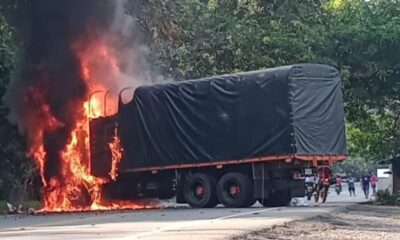Colombia Agrees to New Peace Accord with FARC Guerrilla Group
Last night, the Colombian government and top representatives of the Revolutionary Armed Forces of Colombia (FARC) announced a new peace deal that may finally end the longest-running conflict in the Western Hemisphere.
Speaking from Havana, Cuba, negotiators of the administration of President Juan Manuel Santos and FARC outlined the changes in the new agreement that aim to appease the opposition to an earlier accord that was struck down by a popular referendum on October 2. The president himself then spoke to the nation in a televised address from Bogotá.
The bulk of that 297-page document remains the same, but key amendments address the justice process and confinement provisions for war criminals, democratic participation by the political party that FARC will become once it demobilizes militarily, collaboration with law enforcement to fight drug-trafficking, protection of privately held assets, and the disbursement of FARC property that will go towards victim reparations.
Photo: “This agreement — renewed, adjusted, specified, and clarified — must unite us, not divide us,” said President Santos, pictured here with the Colombian military earlier in the week. (Credit: Presidencia de la República)
Santos said that the government altered 56 of its 57 provisions based upon some 500 proposals submitted since the failed plebiscite to ratify the previous agreement. The president now hopes that his political rivals, and the 50.2% of the voters that said “No” at the ballot box, can accept this “better” deal so that the nation can get beyond the current “fragile ceasefire” with FARC and begin to implement a formal peace.
“This agreement — renewed, adjusted, specified, and clarified — must unite us, not divide us,” said Santos. He added that, “This new peace agreement with the FARC resumes and reflects the proposals and ideas of all those who participated in the great national dialogue” while responding to and clarifying “the concerns that many had against the words, the agreement’s meaning, or its implementation.”
One key change that could have a substantial effect on the nation’s economy is the new mandate that all post-conflict investments will now be made over a 15-year timeframe instead of 10 years. This change was made with fiscal stability in mind, as many of those who voted against the original deal were worried that its aggressive development and social spending provisions would jeopardize the nation’s financial footing.
New conditions, although not detailed fully by the president or lead negotiator Humberto De la Calle, have also been included to ensure full respect for private property. Other worries have surrounded how land reform provisions would be implemented, with landholders concerned that disputed holdings could be appropriated for redistribution to victims.
The government also says it added new safeguards to protect third parties — including companies and other organizations — that could be accused of financing FARC and other combatant groups. Individuals who could be considered to have aided either side will not have to appear in civilian court to defend themselves.
In terms of FARC assets, the government is also now clarifying its intentions to ensure that the property and holdings currently in the hands of guerrillas go to victims. Upon demobilizing and submitting to the justice process, FARC must now declare and inventory all its assets in full.
The next steps towards a formal peace remain unclear. It seems unlikely that Santos will once again put the accord up for a public vote. He has previously suggested that he has the authority to submit the agreement directly to Congress for approval before implementation begins.
Some of the most divisive elements of the earlier accord remain largely unchanged, however. These include the perceived impunity for war criminals who won’t face jail time in actual prisons and FARC being guaranteed 10 seats in Congress over the next two elections.
The new agreement does include more details about the nature of the “restrictions of freedom” that will take the place of prison time for former combatants who fully cooperate with the peace tribunals. It also takes decision-making authority away from foreign judges in the justice process. And it cuts federal funding for a FARC political party by 30%, while preventing former members from running for a few congressional seats reserved for officials from areas most affected by the conflict.
But these are likely to be seen as small changes by the opposition, which could continue to fight the agreement. For starters, former President Alvaro Uribe, the chief political rival to Santos and leader of the opposition to the past deal, held his own press conference last night as well.
Uribe said that though he did meet with Santos yesterday before the formal announcement, he has not seen the new document in full. He also noted that the president should not presume this is a “definitive” agreement until it can be reviewed thoroughly by Uribe and others who remain skeptical.
Santos said that he would provide the full agreement to key opposition members today. “We are going to divulge it widely starting tomorrow so that it is known by all,” said the president last night.

























